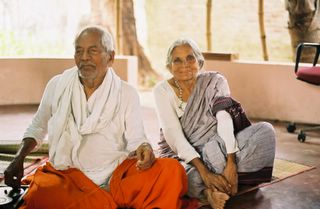"Madam" Krishnammal
The weird days started Saturday afternoon when the man from TATA arrived. TATA a huge Indian corporate conglomerate, but they engage in charitable work. The man was head of tsunami relief for his organization in Nagapattinam District. He was quite a sight. He was dressed as the archetypal off-work wealthy businessman: perfectly neat jeans (jeans! I haven’t seen anyone wearing them in a month!), a pressed, tailored, button-down shirt, and polished leather shoes. His hair and beard were the same once-dark color as David’s, but there were no little straggly bits of moustache falling down into his mouth. The TATA man (I never did learn his name) came from Hyderabad, and spoke not a word of Tamil. At first I liked having him there because it meant that things were explained in English (his English was word-perfect), but after a while I wished we could get rid of him.
It was not until that night that I learned what Amma wanted from him. She wants to make fly-ash bricks (fly-ash is a byproduct of coal burning that, when properly mixed and cured, forms a cement-like substance). These bricks require no burning, which is otherwise a problem during the rainy season. She has a source for fly-ash that will cost her nothing, and all the other ingredients, but she has no money for the machine to make the bricks. This is what she wanted.
The first thing that struck me as funny about the TATA man was that he called Krishnammal “madam.” Never before have I heard someone use a formal form of address when talking to Amma (at least in English), neither “madam” nor “ma’am” nor “Mrs. Jagannathan”, though I have at least seen the last in writing. Either no one told him that Krishnammal is generally called Amma, or he didn’t listen. We all got in the car to go to the brickmaking site at Kohol.
They were mixing mud and building a kiln when we arrived. Everyone was mud-covered. The man started talking about how the bricks could be made uniform in size and composition and should be stamped (he seemed to me to be under the impression that LAFTI was planning to try to sell some of them), and he was full of plans for improving efficiency and decreasing hand labor. He didn’t seem to realize that Krishnammal, like all Gandhians, is most definitely against decreasing manual labor as doing so causes unemployment. Krishnammal, for her part, was in rare form as the simple, schemeless soul who leaves all the planning up to God. The TATA man seemed totally taken in by this, and seemed to think her a little crazy and not very bright. 50 percent correct isn’t too bad. He seemed very surprised that the little, dark man in the torn undershirt and mud-covered dhoti was, in fact, the organizer of the site. He took samples of bricks and drinking water for testing. He didn’t smile at the muddy, unclothed, happy babies. This is always a bad sign.
The next morning, Krishnammal, Veerasamy, Gandhi, Muttukumar, and I went to Akkarapattai. It was exactly seven months after the tsunami, almost to the very hour. Roads had been swept, debris hauled away. Five or six men were knotting bright blue fishing nets on the side of the road. But it was still filled more with ghosts than people, and it seemed hushed. We went to the TATA office, where the man showed us his computer-training programs, and then his model house. It costs three times as much as LAFTI’s, for the same size or maybe a bit smaller. Still, he has the money, and he is planning to get LAFTI the needed machine. The rural secretary of Tamil Nadu was berating him because the house has only two rooms. But that house is bigger than anything that the poor people here have ever lived in, and I can imagine living in it myself.
I met two women there. One, named Roopal, was working at the Gandhi Center in Ahmedabad. She was either American-born (quite possible, as she had very fair skin and gray eyes) or had lived there for a long time, because she spoke what I would normally call unaccented English. Her American accent sounded harsh on my ears after weeks of hearing Tamil. She works on getting Indian youth in America to come and do Gandhian service projects in India. The other woman, Sitalakshmi, grew up in Akkarapattai, and had her house destroyed in the tsunami. She had formed an NGO – Phoenix - doing livelihood work for all the people, not just the fishermen, and was trying to form a coalition of all the local NGOs which had connections to the people there. Neither had ever met Amma, and both were very impressed. They came back to Kuthur that afternoon.
Aliyah


0 Comments:
Post a Comment
<< Home